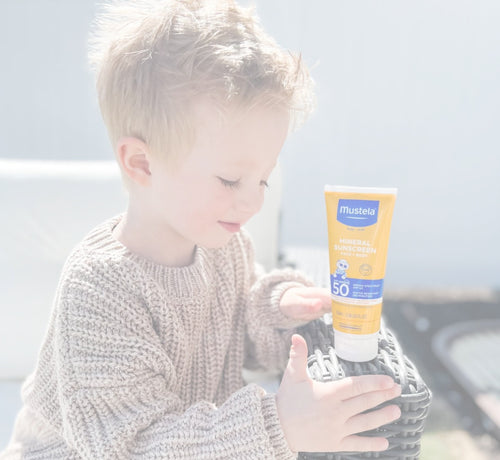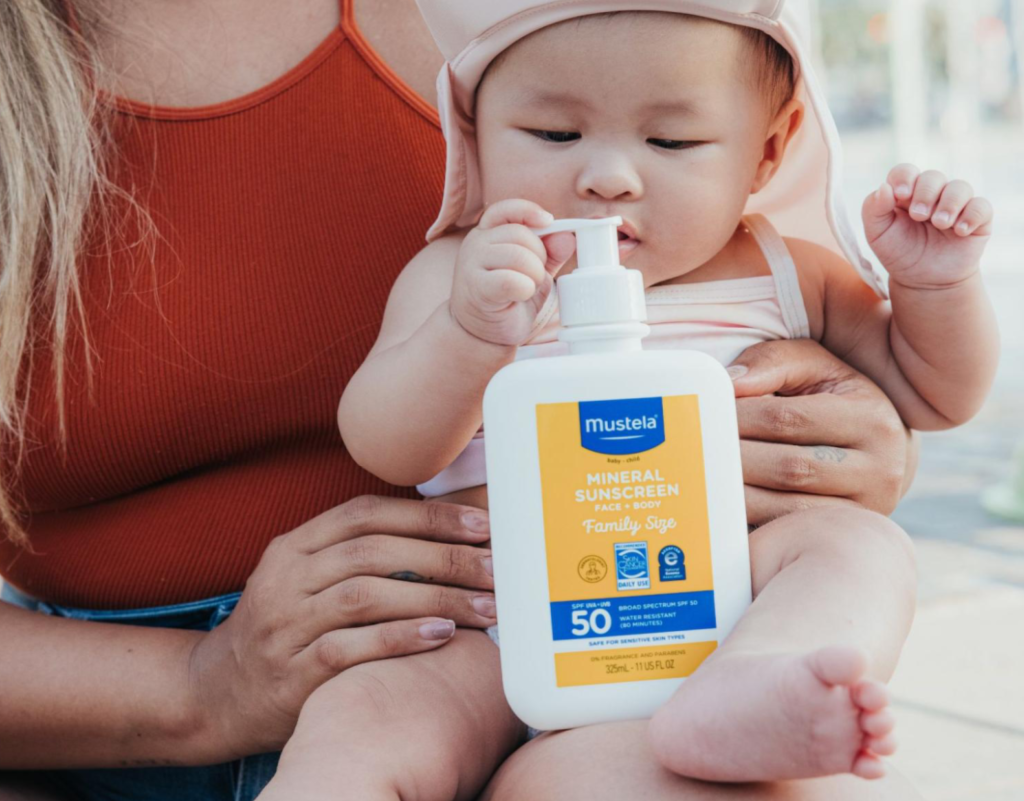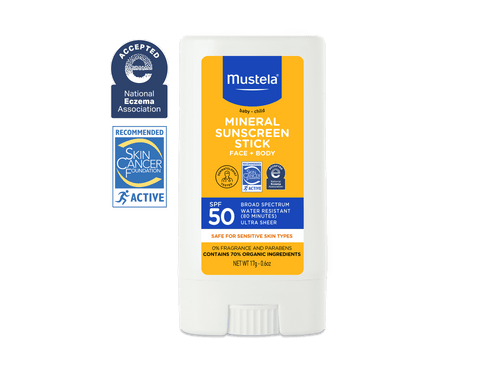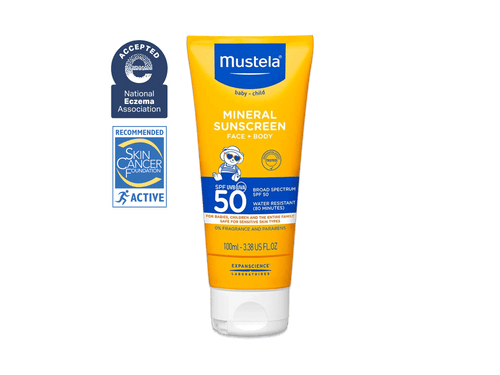Whether you go through it quickly or it gets forgotten in the rush of getting the kids ready for a trip or activity, it may seem like you’re constantly buying sunscreen. So when you come across an old bottle, you may wonder, “Does sunscreen expire?”
In this article, we’ll give you all of the information you need about sunscreen expiration so you know whether it’s OK to use those half-full bottles of spray or lotion that have been sitting in your medicine cabinet or car glove compartment.
Let’s dive in!
Table Of Contents
- Does Sunscreen Expire Before It’s Opened?
- Does Sunscreen Expire Faster After It’s Opened?
- Problems With Using Expired Sunscreen
- How To Tell If Sunscreen Is Expired
Does Sunscreen Expire Before It’s Opened?
When we talk about shelf life and expiration dates for any product, we need to talk about two separate things: how long the product lasts on the shelf before the container is opened and how long it stays good after the container has been unsealed.
The answer to whether sunscreen can expire before the container has ever been opened is yes. Regardless of type, sunscreen doesn’t have an unlimited shelf life.
The U.S. Food and Drug Administration requires that sunscreen products stay at their original strength for a minimum of three years. So, as a general rule, any sunscreen on the market can be considered expired after three years have passed from the date it was bottled.
Unfortunately, the FDA doesn’t mandate that sunscreen manufacturers print a bottling date or expiration date on their products.
Nevertheless, many do put dates on their containers anyway. But you may have to look for it carefully. It may be printed or embossed and may use date formats most people aren’t used to, like putting the last two digits of the year first.
If you can’t find a date, you might assume that any sunscreen you buy is probably good for approximately three years from the date of purchase. After all, demand for sunscreen in the summer is high enough that there’s no way any bottle could linger on shelves too long, right?
You may be surprised. In fact, investigations by consumer advocates have shown that many major retailers have left sunscreen products on their shelves past their expiration dates.
Does Sunscreen Expire Faster After It’s Opened?
Now that we know what the shelf life of an unopened container of sunscreen is, what about after the container has been opened? This is probably more relevant to most of us wondering, “Does sunscreen expire?” when finding a half-used bottle left over from last summer.
Experts say that opening a container of sunscreen doesn’t make it expire any faster. In general, the same rule of three years from the date of manufacture for full UV ray-blocking strength applies.
What matters is where the “shelf” is. So while sunscreen does expire, the speed varies depending on how it’s stored.
The FDA’s three-year guideline is basically a best-case scenario. Whether opened or unopened, the conditions sunscreen is stored in make a big difference in how long it lasts.
If you want your sunscreen to last, the most important tip is to keep it out of heat and direct sunlight. Of course, that may be a challenge for a lot of the places you’re most likely to bring sunscreen.
But if you’re at the beach, wrap your sunscreen in a towel and try to keep it in the shade. Or if you brought a cooler for drinks, putting your sunscreen in the cooler between applications is a great idea.
At home, as long as you store your sunscreen in a cool, dry place, then you shouldn’t have to worry about it losing strength quicker than expected.
Does Sunscreen Type Matter?
Not all sunscreen is the same. Apart from varied SPF ratings, there are mineral-based and chemical-based sunscreens, and you can buy sunscreens in stick, spray, and lotion forms.
When properly stored, all types of sunscreen tend to degrade at approximately the same rate and for the same reasons.
However, chemical-based sunscreens may go bad more quickly, especially if the bottle gets too much sun. There may also be a greater chance of chemical-based sunscreens causing skin irritation if they’re used after they’ve started to break down.
For these reasons, and because chemical-based products can be harsher on children’s more sensitive skin, we recommend a mineral-based sunscreen with clean, non-toxic ingredients, like our SPF Mineral Sunscreen Line.
Problems With Using Expired Sunscreen
So now you know whether sunscreen expires and how quickly. But you may be wondering just how big a deal using sunscreen that’s expired really is.
There are several reasons why it’s not ideal to use expired sunscreen.
Inconvenient Application
Whether you’re using a mineral-based or chemical-based sunscreen, ingredients called dispersants are used to make the product easier to spread over your skin.
Over time, dispersants can degrade. This can result in the texture of the sunscreen changing, making it frustrating to apply evenly. Of course, an uneven application will make the sunscreen less effective.
Reduced Effectiveness
As we’ve mentioned, the FDA’s sunscreen expiration requirement mandates that sunscreen products retain their full strength for three years.
Does sunscreen expiration mean that it becomes completely ineffective at blocking out damaging UVA and UVB rays after it passes the three-year cutoff? No. It’s impossible to say exactly how fast the strength of expired sunscreen will degrade.
We can say with certainty, though, that expired sunscreen won’t give you the full amount of protection its SPF rating promises. And the older a bottle gets, the more its protection will be compromised.
You can’t count on expired sunscreen to give your family the best protection from the harmful effects of sun exposure. So make sure you’re using sunscreen that’s at full strength in your daily routine.
Skin Reactions
In especially old containers of sunscreen, it’s possible that bacteria growth can occur if the preservatives inside break down. This can lead to rashes and acne when the product is rubbed on your skin. Babies and young children with delicate skin may particularly be at risk.
In addition, many chemical-based sunscreens contain avobenzone and octinoxate as active ingredients. When these ingredients become oxidized, they can cause an allergic reaction called contact dermatitis, which looks a lot like a blistering sunburn.
How To Tell If Sunscreen Is Expired
So let’s come back to that bottle of sunscreen from last summer (or was it the summer before that?) that you come across in the back of your car or your diaper bag. If you can’t find a date, or if you aren’t sure what type of conditions it’s been in, how can you tell if it’s still good?
Simply put, if there’s any change in the color, texture, or smell of the product, it’s probably no longer fit to use.
Since stores selling expired sunscreen is something that’s known to happen, you should also return any sunscreen with an “off” smell, color, or texture when you first open the bottle. (Keep in mind that mineral sunscreens typically need to be mixed by shaking before the first use.)
It’s a good idea to write the date in permanent marker on the container when you buy any new sunscreen to save yourself the trouble of looking for a printed or embossed date in the future.
Using The Right Amount Of Sunscreen
Some families end up accumulating half-used bottles of sunscreen because they’re always on the go. If you find that bottles seem to last you multiple summers, however, it might be worth considering whether you’re using as much sunscreen as you should.
Most sunscreen containers hold about 4 ounces. That’s only enough to last a single person at the beach for a day or so if they’re reapplying as much as recommended.
If you’re looking for a great option that will last, we offer our SPF 50 Mineral Sunscreen Lotion Family Size in a heftier 11-ounce option that’s way more convenient than juggling multiple tiny bottles if you’ve got a family outdoor adventure planned.
Family Fun In The Sun With Mustela
Does sunscreen expire? Now you know the answer is yes. If you want to keep your family protected outdoors, you should make sure you’re using full-strength, unexpired sunscreen.
Looking for high-quality products? The Mustela sunscreen line is hypoallergenic, fragrance-free, and comes in stick, spray, and lotion application types.
Our products are safe for eczema-prone skin, and you’ll never have to worry about buying sunscreen that’s already expired like you do when you buy off the store shelf.
Keep your family’s skin looking and feeling great this summer and the whole year round with products you trust!















